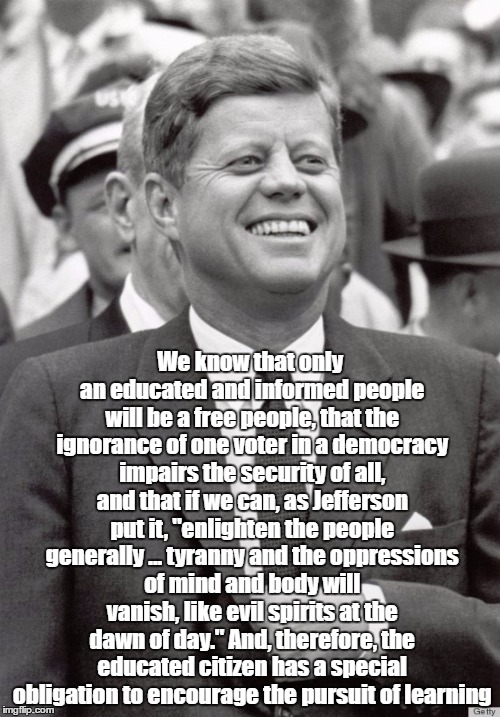
John F. Kennedy Speeches
Remarks in Nashville at the 90th Anniversary Convocation of Vanderbilt University, May 18, 1963
You have responsibilities, in short, to use your talents for the benefit of the society which helped develop those talents. You must decide, as Goethe put it, whether you will be an anvil or a hammer, whether you will give to the world in which you were reared and educated the broadest possible benefits of that education. Of the many special obligations incumbent upon an educated citizen, I would cite three as outstanding: your obligation to the pursuit of learning, your obligation to serve the public, your obligation to uphold the law.
If the pursuit of learning is not defended by the educated citizen, it will not be defended at all. For there will always be those who scoff at intellectuals, who cry out against research, who seek to limit our educational system. Modern cynics and skeptics see no more reason for landing a man on the moon, which we shall do, than the cynics and skeptics of half a millennium ago saw for the discovery of this country. They see no harm in paying those to whom they entrust the minds of their children a smaller wage than is paid to those to whom they entrust the care of their plumbing.
But the educated citizen knows how much more there is to know. He knows that "knowledge is power," more so today than ever before. He knows that only an educated and informed people will be a free people, that the ignorance of one voter in a democracy impairs the security of all, and that if we can, as Jefferson put it, "enlighten the people generally ... tyranny and the oppressions of mind and body will vanish, like evil spirits at the dawn of day." And, therefore, the educated citizen has a special obligation to encourage the pursuit of learning, to promote exploration of the unknown, to preserve the freedom of inquiry, to support the advancement of research, and to assist at every level of government the improvement of education for all Americans, from grade school to graduate school.
Secondly, the educated citizen has an obligation to serve the public. He may be a precinct worker or President. He may give his talents at the courthouse, the State house, the White House. He may be a civil servant or a Senator, a candidate or a campaign worker, a winner or a loser. But he must be a participant and not a spectator."
https://www.jfklibrary.org/Research/Research-Aids/JFK-Speeches/Vanderbilt-University_19630518.aspx


https://www.jfklibrary.org/Research/Research-Aids/JFK-Speeches/Vanderbilt-University_19630518.aspx
H.G. Wells: "Human History Becomes More And More..."
http://paxonbothhouses.blogspot.com/2013/03/hg-wells-defining-human-dilemma.html

http://paxonbothhouses.blogspot.com/2013/03/hg-wells-defining-human-dilemma.html

Don't think for a moment that anything else will work.


"There is no fear in love.
But perfect love drives out fear, because fear has to do with punishment.
The one who fears is not made perfect in love."
John 4:18
"Any Religion That Needs Fear To Thrive Is Bad Religion"
But perfect love drives out fear, because fear has to do with punishment.
The one who fears is not made perfect in love."
John 4:18
"Any Religion That Needs Fear To Thrive Is Bad Religion"

No comments:
Post a Comment